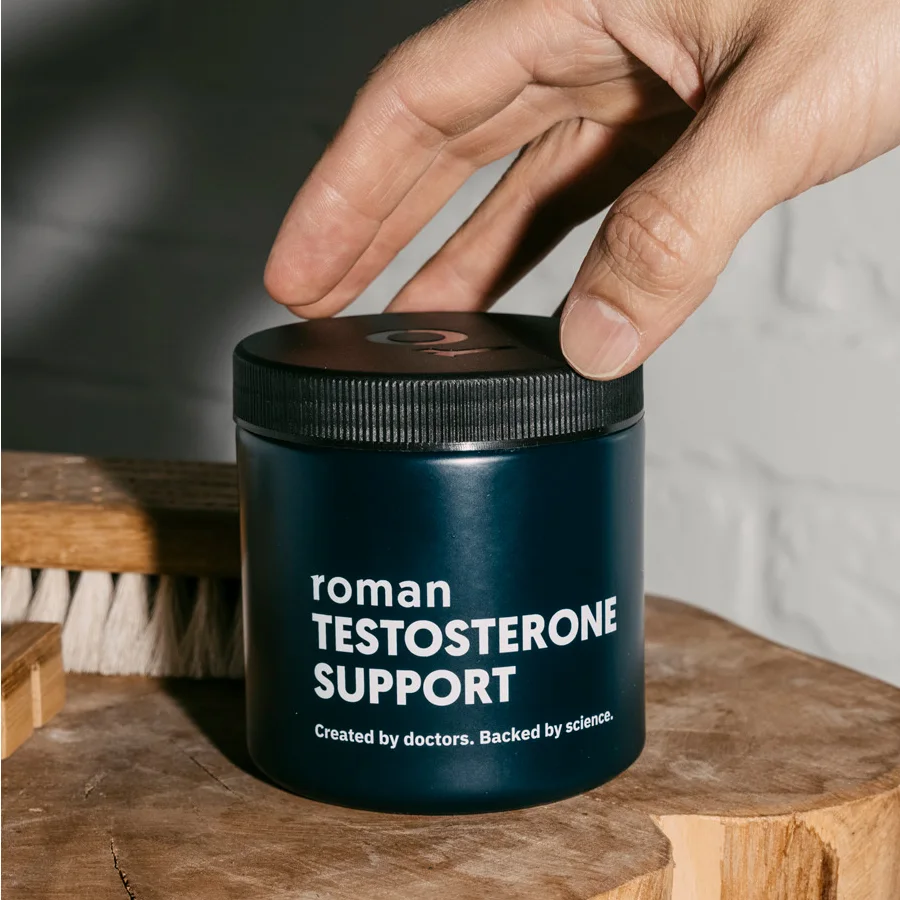Here's what we'll cover
Here's what we'll cover
Masturbation: nature’s stress release since time immemorial.
But for some people, that stress release comes with added anxiety. If you are worried about low testosterone (T) or experience low T, you may wonder—does masturbating decrease testosterone? The short answer is there isn’t a proven link between orgasms and testosterone levels, so we don’t know how it affects you in the short term. However, you can take comfort in knowing that masturbating will not negatively affect your testosterone levels—or other aspects of your life—long-term. Keep reading to learn more about the connection between orgasming and testosterone.
What is testosterone?
Testosterone is the primary male sex hormone and belongs to a group of hormones named androgens. Women also produce testosterone, but at much lower levels. Testosterone impacts muscle mass, fat distribution, body hair, sexual arousal, and red blood cell formation, among many other processes in the body (Nassar, 2022).
Some theorize that testosterone levels on the day of a sports competition may play a role in athletic performance, which explains why you might have heard unsubstantiated stories of Olympic coaches telling athletes to be abstinent before they compete in events (Dent, 2012). The unproven theory is that a lack of orgasm equals higher T levels. But is that popular theory true?
Again, the answer is we're not entirely sure. The little research into this topic has produced varied results. One early study from the 1970s found the opposite, that orgasms increased testosterone, at least in the short term (Purvis, 1976). A more recent study of men unable to orgasm due to erectile dysfunction found that they had significantly lower total and free testosterone (Jannini, 1999).
Another study found that blood plasma levels of testosterone did not change after ejaculation, though levels were elevated in those who abstained from ejaculating for three weeks (Exton, 2001). More research found that serum testosterone levels suddenly spiked after seven days of abstinence (Jiang, 2002).
How could these studies have such radically different results? All of them involved a small number of participants, which means there's a higher chance that differences between the participants could impact the results. Age, diet, fitness level, medications, and other factors could all impact participants' testosterone levels.
So, does masturbating decrease testosterone?
Testosterone levels are constantly changing, even throughout the course of one day. If you’ve ever taken a blood test to measure your T levels, you might remember having to give a blood sample in the morning, between 8 and 10 am. That’s because, during these hours, testosterone levels are naturally the highest.
They might also change day to day depending on many factors (which explains why your healthcare provider may require two blood tests on separate mornings to get an accurate picture of your T levels).
A small study found that the scent of an ovulating woman may increase testosterone in heterosexual men (Cerda-Molina, 2013). Other research even suggests that simply talking to a woman can increase testosterone levels in heterosexual men (Roney, 2007). (It’s important to note that much of the research on this topic has been performed in heterosexual men, and we hope to see more inclusive research in the future). But the trigger that spikes your testosterone levels doesn't even need to be sex-centric. For example, skipping dinner has been shown to temporarily lower testosterone levels (Trumble, 2010).
With all the factors that can cause your levels to rise and fall, masturbating alone isn’t likely to affect your baseline and should not impact testosterone levels enough to impact your sex life significantly.
Causes of low testosterone
Clinically low testosterone, or low T, is different from the daily ups and downs of average testosterone levels.
Low T (clinically known as hypogonadism) means the testes and/or adrenal glands (but mostly the testes) don’t produce the proper amount of testosterone (Sizar, 2021). Testosterone naturally declines as people age. Some researchers estimate that almost 40% of men over 45 have low T (Mulligan, 2006).
In addition to the natural decline that comes with age, there are many possible causes of low T. Low testosterone might be caused by a medication (including steroids or opioids), an underlying health condition, obesity, sleep problems, HIV, and more (Sizar, 2021).
What are the symptoms of low testosterone?
Symptoms of low T include (Sizar, 2021):
Low sex drive (libido)
Fewer spontaneous erections (“morning wood”)
Hair loss in the armpits or pubic region
Hot flashes
Loss of concentration
Increased body fat
Decreased lean muscle mass
Many of these symptoms may also be the result of another health condition. If you experience any of these signs of low T, make an appointment with your healthcare provider.
Ways to raise testosterone levels
Low testosterone is treatable with testosterone replacement therapy (TRT), although not everyone is a good candidate for the treatment. In some cases, you can also support testosterone levels with healthy lifestyle changes.
If you read enough articles about health, it may start to sound like "healthy diet and exercise" are the only solutions to well-being. These practices certainly don’t solve everything, but they're almost always a good idea. In one of their guidelines, the American Urological Association (AUA) recommends that exercise and weight management have the potential to increase total testosterone levels and reduce signs and symptoms that come with low T (Mulhall, 2018).
Get regular exercise
Some research suggests that endurance or cardiovascular exercises (like running or stationary biking) may support testosterone health, especially at moderate-to-high intensity levels. Proper hydration during exercise may also play a role (Riachy, 2020).
Other data indicate that resistance exercises (like weight lifting) benefit testosterone levels, but your routine matters. For example, one study found no notable change in testosterone in men who only worked their biceps, though hormone levels did rise in those who included leg presses and knee extensions. Researchers hypothesize that working larger muscles may lead to more testosterone changes—but more research is needed (Riachy 2020). Just one more reason not to skip leg day!
Eat a balanced diet
Healthy men have higher levels of testosterone. Along with exercise, the best path to health is through your diet. You might hear in the locker room or read online that some foods will supercharge your body's T production.
But whether any individual food has any significant impact on testosterone in humans has yet to be determined. The best approach to overall health is to eat a diverse diet packed with plenty of plants, lean proteins, healthy fats, and whole-food carbohydrates.
The bottom line? Masturbation doesn’t seem to have a significant impact on testosterone levels––at least not long term. Low testosterone, however, is a real issue that many people experience. If you experience symptoms of low T, speak with a healthcare provider who can help create a treatment plan that works for you.
DISCLAIMER
If you have any medical questions or concerns, please talk to your healthcare provider. The articles on Health Guide are underpinned by peer-reviewed research and information drawn from medical societies and governmental agencies. However, they are not a substitute for professional medical advice, diagnosis, or treatment.
Cerda-Molina, A. L., Hernández-López, L., de la O, C. E., et al. (2013). Changes in men’s salivary testosterone and cortisol levels, and in sexual desire after smelling female axillary and vulvar scents. Frontiers in Endocrinology, 4,
doi:10.3389/fendo.2013.00159. Retrieved from https://pubmed.ncbi.nlm.nih.gov/24194730/
Dent, J. R., Fletcher, D. K., & McGuigan, M. R. (2012). Evidence for a non-genomic action of testosterone in skeletal muscle which may improve athletic performance: implications for the female athlete. Journal of Sports Science & Medicine , 11 (3), 363–370. Retrieved from https://www.ncbi.nlm.nih.gov/pmc/articles/PMC3737931/
Exton, M. S., Krüger, T. H., Bursch, N., et al. (2001). Endocrine response to masturbation-induced orgasm in healthy men following a 3-week sexual abstinence. World Journal of Urology, 19 (5), 377–382. doi:10.1007/s003450100222. Retrieved from https://pubmed.ncbi.nlm.nih.gov/11760788/
Finkelstein, J. S., Lee, H., Burnett-Bowie, S. A. M., et al. (2013). Gonadal steroids and body composition, strength, and sexual function in men. The New England Journal of Medicine , 369 (11), 1011–1022. doi:10.1056/NEJMoa1206168. Retrieved from https://pubmed.ncbi.nlm.nih.gov/24024838/
Jannini, E. A., Screponi, E., Carosa, E., et al. (1999). Lack of sexual activity from erectile dysfunction is associated with a reversible reduction in serum testosterone. International Journal of Andrology , 22 (6), 385–392. doi:10.1046/j.1365-2605.1999.00196.x. Retrieved from https://pubmed.ncbi.nlm.nih.gov/10624607/
Jiang, M. (2002). Periodic changes in serum testosterone levels after ejaculation in men. Sheng Li Xue Bao: [Acta Physiologica Sinica], 54 (6), 535–538. Retrieved from https://pubmed.ncbi.nlm.nih.gov/12506329/
Mah, P. M. & Wittert, G. A. (2010). Obesity and testicular function. Molecular and Cellular Endocrinology , 316 (2), 180–186. doi:10.1016/j.mce.2009.06.007. Retrieved from https://pubmed.ncbi.nlm.nih.gov/19540307/
Moreno-Escallon, B., Ridley, A. J., Wu, C. H., & Blasco, L. (1982). Hormones in seminal plasma. Archives of Andrology , 9 (2), 127–134. doi:10.3109/01485018208990230. Retrieved from https://pubmed.ncbi.nlm.nih.gov/6890792/
Mulligan, T., Frick, M. F., Zuraw, Q. C., et al. (2006). Prevalence of hypogonadism in males aged at least 45 years: The HIM study. International Journal of Clinical Practice , 60 (7), 762–769. doi:10.1111/j.1742-1241.2006.00992.x. Retrieved from https://pubmed.ncbi.nlm.nih.gov/16846397/
Mulhall, J. P., Trost, L. W., Brannigan, R. E., et al. (2018). Evaluation and management of testosterone deficiency: AUA Guideline. Journal of Urology, 200 (2), 423–432. doi:10.1016/j.juro.2018.03.115. Retrieved from https://pubmed.ncbi.nlm.nih.gov/29601923/
Nassar, G. N. & Leslie, S. W. (2022). Physiology, testosterone. StatPearls . Retrieved on Jan. 31, 2022 from https://www.ncbi.nlm.nih.gov/books/NBK526128/
Purvis, K., Landgren, B. M., Cekan, Z., & Diczfalusy, E. (1976). Endocrine effects of masturbation in men. The Journal of Endocrinology , 70 (3), 439–444. doi:10.1677/joe.0.0700439. Retrieved from https://pubmed.ncbi.nlm.nih.gov/135817/
Puts, D. A., Pope, L. E., Hill, A. K., et al. (2015). Fulfilling desire: Evidence for negative feedback between men’s testosterone, sociosexual psychology, and sexual partner number. Hormones and Behavior, 70, 14–21. doi:10.1016/j.yhbeh.2015.01.006. Retrieved from https://pubmed.ncbi.nlm.nih.gov/25644313/
Riachy, R., McKinney, K., & Tuvdendorj, D. R. (2020). Various factors may modulate the effect of exercise on testosterone levels in men. Journal of Functional Morphology and Kinesiology, 5 (4). doi:10.3390/jfmk5040081. Retrieved from https://www.ncbi.nlm.nih.gov/pmc/articles/PMC7739287/
Roney, J. R., Lukaszewski, A. W., & Simmons, Z. L. (2007). Rapid endocrine responses of young men to social interactions with young women. Hormones and Behavior, 52 (3), 326–333. doi:10.1016/j.yhbeh.2007.05.008. Retrieved from https://pubmed.ncbi.nlm.nih.gov/17585911/
Sizar, O. & Schwartz, J. (2021). Hypogonadism. StatPearls . Retrieved on Jan. 31, 2022 from https://pubmed.ncbi.nlm.nih.gov/30422528/
Trumble, B. C., Brindle, E., Kupsik, M., & O’Connor, K. A. (2010). Responsiveness of the reproductive axis to a single missed evening meal in young adult males. American Journal of Human Biology, 22 (6), 775–781. doi:10.1002/ajhb.21079. Retrieved from https://pubmed.ncbi.nlm.nih.gov/20721980/
Vaamonde, D., Da Silva-Grigoletto, M. E., García-Manso, J. M., et al. (2012). Physically active men show better semen parameters and hormone values than sedentary men. European Journal of Applied Physiology, 112 (9), 3267–3273. doi:10.1007/s00421-011-2304-6. Retrieved from https://pubmed.ncbi.nlm.nih.gov/22234399/










